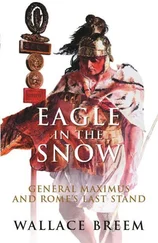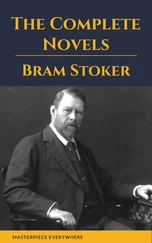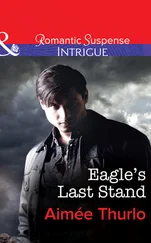She said in a shaking voice, “One of them got away. I am glad. Now they will know how many men you really have.”
“Don’t be too pleased, my girl. The sooner they come the sooner you, too, will die.”
Thirty minutes after dawn, two cohorts were drawn up in a hollow square on the parade ground. All the centurions and all the officers were present, and the sentries on the walls faced inwards. The girl was brought out under escort and tied to a stake driven into the ground. The stake faced a low platform, upon which stood the legion’s farrier and a number of military police. The officers wore plumes upon their helmets, and the aquilifer wore a black panther skin and held the Eagle, which was hooded to conceal the shame that we felt. When I came out in my full uniform, which I only wore on special occasions, it was bitterly cold and I could see the lances held upright, quivering as though with fear. It was very cold and very quiet and you could hear the jingle of the bit as Quintus’s horse tossed its head.
Then we heard the sound of nailed sandals, and they brought him into the square, walking quickly as a man does who is late for an appointment; and he wore nothing but a tunic and a kilt. His uniform stood in a pile upon the platform, together with his sword and his helmet. It was customary for the sword to be broken, but we were short of such weapons and, at the quartermaster’s request, had substituted an old sword with a flawed blade which had been marked for disposal. He mounted the platform, and he looked like a ghost. He kept on wetting his lips with his tongue—or trying to, and his eyes seemed to be bulged with fear. We could all see that he was terrified of dying and he kept on making small whimpering noises, though he did not actually try to speak. The camp praefectus read the punishment and sentence in a high voice that cracked with nervousness. The flawed sword was then broken, ceremonially, across the duty centurion’s knees.
The camp praefectus turned to me and I nodded to him to get on with the whole ghastly, stupid, futile ritual. Even Quintus did not guess how I hated it all. The prisoner was asked if he had anything to say. He shook his head, desperately. We could hear his teeth chattering, but this might have been due to the cold as much as to fear. At such a time, it is kinder to give any man the benefit of the doubt. A trumpet sounded, the farrier stepped forward and the boy was pushed down onto his knees. The trumpet sounded again, and sentence of death by decapitation was performed upon Marcus Severus, former tribune of the legion, for desertion, treason and cowardice. The girl, soaked with his blood, was left tied to the post, alone with the body of the man whom she had enticed to his death. After an hour, she was cut down and taken back to her hut. The body was buried on the road outside the town; the platform was dismantled, and life in the camp returned to normal. That night, Quintus went out fishing with some of the tribunes and then got horribly drunk, later, in his hut. I went down to the town and attended a cock-fight. I won a lot of money. My luck was in, and the day ended better than it had begun.
XIV
AS A PUNISHMENT I sent Fabianus back across the river. He hated it there; he was a man who liked comfortable living. A week later he sent me a signal to say that the movement of waggons out of the enemy camp had stopped. Instead, waggons and families were coming in; and it looked as if those who had left were returning. Of food convoys from the Burgundians, however, there was no sign.
I said to Quintus, “That means the man did not die. They know how many we are; they will stay and wait.”
“But they will surely starve if they wait till the spring?”
“Perhaps. These people can smell the weather like an animal. They will wait till midwinter. If the winter is a bad one, the Rhenus will freeze and give them their opportunity. If it does not, they will break camp and head for their own lands.”
He said urgently, “What about the bridge? Will you take the legion over now?”
I shook my head. “Not now. They know our strength. Besides, Marcomir is dead and his men scattered. The risk is too great.”
He took a deep breath. He said, “We should have made the bridge when he was alive; when it was suggested first.”
I held up my hands, palms outwards in a gesture of surrender. “Yes,” I said. “I missed the opportunity.”
“Don’t look like that, Maximus.”
“Quintus, it is true.”
“So. What do we do then?”
I looked at him and, for the first time in weeks, I smiled as I did so. “You and I will go to Treverorum. We could do with a change of scene and I need a rest as much as you. It will be the last chance we shall get this year. Aquila can command.”
On a cool October day, when there was a mist like milk over the river, we left Moguntiacum and set out on the long ride back to the city. It was a road I knew well now. As the miles passed under our horses’ feet our spirits rose. The weather held; it was clear and fine. We talked together of the old days on the Northern Wall, of wolves we had hunted, of deer we had killed and of a boar that we had pursued without success, all through one long wet day. We talked of Saturninus and of his friends who had shared our mystery, and who were now dead. But we never talked of my wife.
The few patches of bracken that I saw were a golden brown and the leaves were brittle on the trees as they changed from green to a brown the colour of dark honey. One morning we saw a flight of swans, skimming low in arrowhead formation above the trees towards the Mosella. Sometimes we rode in silence and I would think of Julian in that patch-work camp of strange tongues across the river. What would he do now that Rando was dead? Would he wait to cross with the others or would he turn away and find somewhere else to settle? I did not hate him now and the memory of the past had blurred a little. It was all such a long time ago. He was, after all, still Julian whom I had once loved as a friend. He was a part of my life, a part of me, and the realisation of this made me jerk suddenly at my horse so that he flung up his head. Quintus glanced at me without speaking.
“One half of my life has destroyed the other half,” I said aloud, and Quintus flushed and bit his lip. He was too proud to make excuses, too honest to apologise for things he had done, about which he could not be sorry.
At Treverorum we took up our old quarters in Romulus and I could relax inside those massive, cool stone walls, watch the afternoon sun make shifting patterns on the mosaic, listen to the sounds and cries of the city as it went about its business, and make plans for amusing myself in the coming evening. There was, of course, a certain amount of business that I could not neglect. I inspected the cohort on garrison duty, dined with Flavius, watched the training of the city auxiliaries, and made arrangements for improving the defences of the town. On the surface of the bridge over the Mosella bundles of brushwood were piled against the rails and lashed to the transoms. If necessary, they could be soaked with pitch and fired in a few minutes. I did not expect that an attack, pushed inland, would be made along the northern road but it was well to be prepared. Though, as Quintus said sardonically, when I told him what I had done, “If things get as bad as that who will be left alive to bother about such matters.”
Then I called a meeting of the senators and senior officials, told them what precautions I had taken and warned them that the next three months would be crucial. I had deliberately selected the great hall of the Basilica for this occasion, and though there were thirty of us present, we were dwarfed by the size of the place and our voices echoed strangely in that vast room.
Читать дальше












